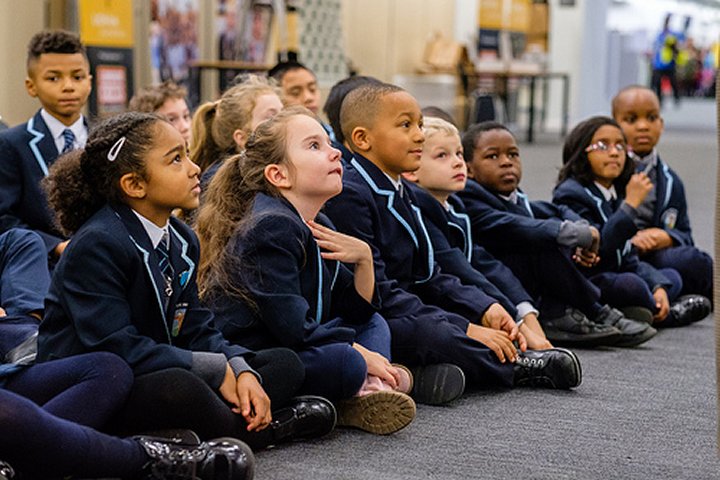When Young Chess Players Take Over Olympia
by Tim Wall, Press Officer, London Chess Classic
It’s 9:00am on Friday, December 14 – and for now, all is peaceful at the London Chess Classic.
World top players Fabiano Caruana, Hikaru Nakamura, Maxime Vachier-Lagrave and Levon Aronian are enjoying a rest day after their exertions the day before in six nerve-shredding games of Rapid & Blitz to decide the Grand Chess Tour Semi-Finals. Maybe they’re still sleeping, or just waking up for a day of quiet preparation before the action starts again on Saturday, December 15: Day 1 of the 3-Day Final (and Third Place Playoff), when big money, honour and the top spots in the world rankings will be at stake.
For the 200 players in the FIDE Open, ranging from enthusiastic amateurs to professional Grandmasters, the tournament’s next round is seven and a half hours away. Like Fabi and his colleagues, they are nowhere to be seen, and are probably blissfully unaware of what is about to unfold at Olympia London, the conference centre that every December for the last 10 years has played host to the London Chess Classic.
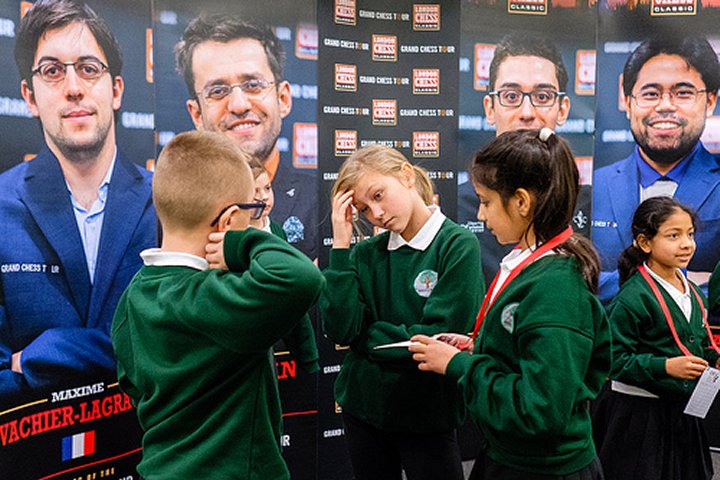
Schoolchildren in the foyer of the Olympia Conference Centre, in front of photographs of the players in the London Chess Classic
And yet in a few minutes Olympia will already be abuzz with some 450 schoolchildren, aged 7 to 11, decked out in school uniforms and high-visibility fluorescent jackets, who have swarmed to the nation’s chess Mecca from around the country. Many from London and the South East, but also some from as far afield as Middlesbrough, Leeds, Birmingham and Cardiff.
Some children have been on trains for hours since the wee hours already to get to Olympia, while others even travelled down to London the day before, on coaches organised by their schools. The army of would-be Fabianos, Magnuses and Hou Yifans is accompanied, watchfully, by another army (smaller, but still sizeable) of schoolteachers, Chess in Schools and Communities tutors, and parents, who are herding the children into the lobby, past the giant chess set and up in the elevators to the third floor, where the biggest chess event any of the children will have seen is about to unfold.
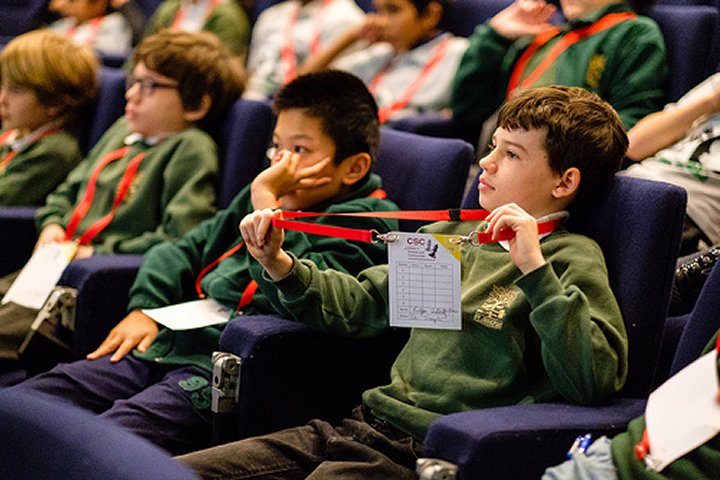
The lanyard that all players wear, as well as identifying them and their school, also contains a tournament pairing card.
Children deposit their coats in the cloakroom, and each school party is given a place in the centre to sit, to take their lanyard and ID card (it also doubles as their pairing card for the schools tournament to come) and instructions from CSC staff about the day ahead, and then it’s into the East Hall, where an event-packed day begins.
To a visitor entering the hall, it looks like hundreds of miniature Spitfire fighter pilots receiving their last-minute briefing missions at an RAF air base during the Battle of Britain. From a dozen to 20 children are gathered around a dozen easels and boards, with instructors pointing with sticks at various points on the chess map – where to attack, where to defend, how to engage the enemy in sorties, and how to avoid disaster.
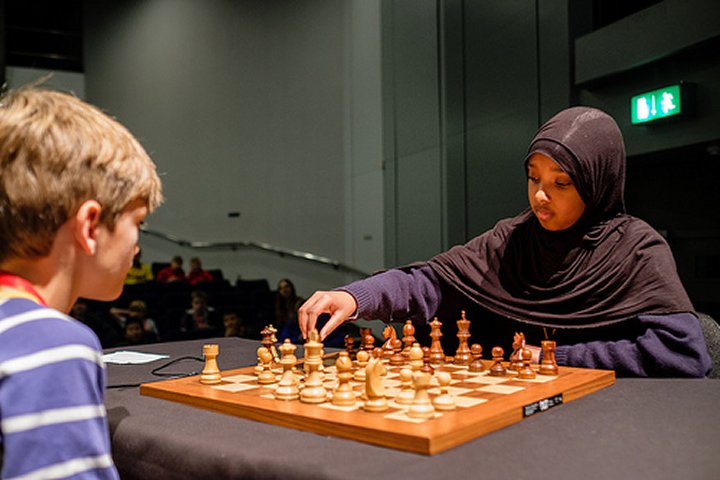
Players using the same high-quality DGT wooden boards as are used in the London Chess Classic.
These little warriors are about to go into battle – and they are loving every minute of it.
The language spoken may all be English, but every nationality, ethnicity and creed you can think of is represented here. It is a tapestry of modern-day 21st century Britain, rich with joyful talent, hope and ambition to succeed. It underscores the central message of what the London Chess Classic is about: that chess is fun, and a universal game for everyone. Looking around, girls and boys are represented in practically equal number – there is no gender preponderance here.
From Stalemate to Four-Move Mate
Some groups are being taught quite advanced concepts, as I survey the hall, such as a problem that ends in a smart stalemate, while others are being shown basic checkmates or the principles of opening development and castling.
I join the group led by Adam Bukojemski, a Polish-born chess tutor (who happens to be a strong player, but this is absolutely not a requirement for the tutors – much more important are teaching skills and the ability to convey enthusiasm for the game). He is teaching a group of 15 students. Despite the vast size of the hall, it’s difficult to make yourself heard above the hubbub of a dozen other tutors, children chattering good-naturedly, questions being answered, and so on. But he does, often with theatrical hand gestures, a clear voice – and lots of empathetic eye contact with his class.
We are looking at the “Four Move Mate,” (aka “Scholar’s Mate”) and how to prevent it. This staple of children’s chess lessons everywhere, it’s not being taught to encourage children to try it, but as a necessary stepping stone in the learning process – how to set up a threat, combine the pieces in attack, find a weak spot in the opponent’s camp to target, how to defend against an attack, and why bringing out the queen so early is such a double-edged sword. Every child gets to participate – to answer questions, to come up to the demonstration board and make their suggested move – and everyone is encouraged and praised for their efforts.
Then we play a rapidfire, half-hour simultaneous display against the children. I join in with Adam, playing in tandem, and we literally sprint around the boards so as not to allow the children to get bored. Playing chess at this age and level is not so much about deep thought as learning by interaction: You go here, I go there, and we chat about the moves – exulting and commiserating after every adventure on the chess board. Before children learn about the deeper mysteries of the game, it’s presented as drama, and again fun.
The Grandmaster Show
Another part of the morning’s activities takes place is the Grandmaster Show in the main auditorium for the London Chess Classic, where in a day’s time the Grand Chess Tour Finals and British Knockout Finals will be played out on the stage. Small groups of children are invited in turn to come up on to the stage, sit in the seats that tomorrow will be occupied by Grandmasters, and play a game on the beautiful wooden DGT-linked sets that will be used in the Classic. Moves are transmitted on giant screen behind them, and they crane their necks to see them as GM Chris Ward describes checkmates and famous games.
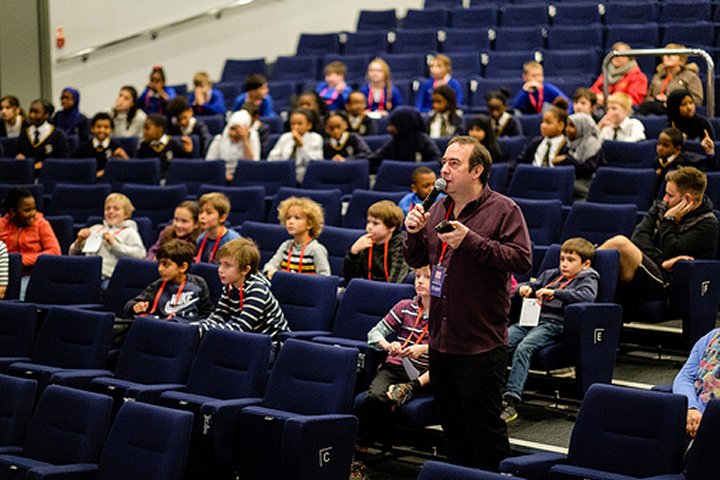
Chris Ward
The children sitting in the cinema-style seats are obviously transfixed. It’s a world away from their school classroom, the place where they usually play.
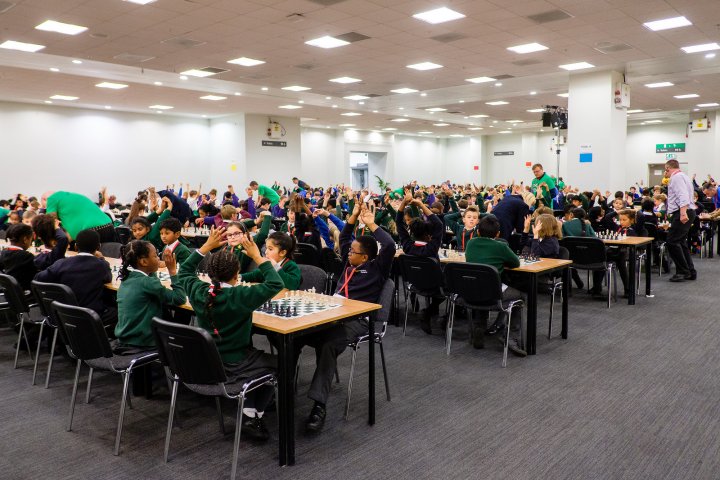
The East Hall packed with excited children representing all parts of the UK.
Painless Pairings
After a brief lunch, it’s time for the serious business of the schools tournament to begin (except that this is also lots of fun). The children are sorted into age groups (the magic lanyard does its work here again, as they are colour-coded by Year 2,3, 4 and so on) and then paired under what its inventor, CEO of Chess in Schools and Communities, Malcolm Pein, somewhat ironically calls ‘Painless Pairings’ (or should that be ‘Peinless’?). Colour sequences are maintained, as far as possible, but children simple pair off themselves with another child on the same score group. They identify each other by the scores on their lanyard/pairing card.
The scoring system is the same as the one used in the UK Chess Challenge: 3 points for a win, 2 points for a draw, and 1 point for playing the game. After 5 games, therefore, the children with the nearest to 15 points are winners – but there are lots of prizes awarded, for individual and team performance. Gold, silver or bronze badges are awarded to all the children from each school, based on the top five scores from that school. (In that sense, it’s a bit like the Tour de France, in that you can play a supporting role as a Team Member without actually wearing the yellow jersey yourself.)
The prizes are awarded by Malcolm and other CSC staff, speaking through a properly functioning microphone and PA system (chess tournament organisers, please note). Cheers and whoops of joy ring out as the name of every single school is called out, including by children from other schools just swept up in the happy mood of achievement and mutual congratulation.
The Google Experience
This year is the second time that CSC has also organised children’s tuition and tournaments at the Google UK head offices near King’s Cross, where the Semi-Finals of the Grand Chess Tour and the British Knockout were being held this week. It’s the same basic format, with tuition, simuls and a schools tournament, adjusted for the fact that we’re in the working offices of DeepMind, Google’s ground-breaking artificial intelligence research company. So, the numbers there are fewer (65 children can be accommodated) but the surroundings are spectacular – a kind of Willy Wonka Chocolate Factory for techies, with high-tech elevators whizzing up and down the building and spectacular views of King’s Cross and St Pancras from the eighth floor.

Joyous celebrations as the London players score a win.
At Google, a few lucky children also got to play the ceremonial first moves for the players in the Classic, quite the experience for a primary-school age child. It’s a tradition that has been practiced at all editions of the London Chess Classic – as a way to inspire the youngest chess players and connect them with their role models, the world’s very best players.
As part of the week’s activities, on Wednesday December 12, a group of London school children also got to play a live video-link chess match with a group of children from the French town of Asnières, near Paris, courtesy of the French Chess Federation and sponsor EDF, the French power company. The London team won 2-0, to great cheers from the children assembled at the DeepMind offices.
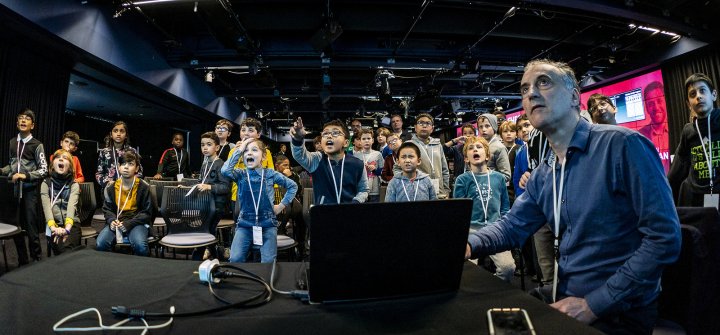
Malcolm Pein
"Life-Changing Experience"
A hard-bitten tournament veteran of 40 years might think, ‘What’s the big fuss about a basic-level schools tournament?’ But that would be missing the point. For a large number of the children there, this will be their first-ever tournament of any description – and certainly of this size and national scale.
I ask Teesside-based Sean Marsh, a CSC National Trainer and one of the charity’s longest-serving tutors, what coming to the London Chess Classic means for the children and the schools who send them from his region.
“It is literally a life-changing experience,” Sean says. “A year or even some months ago, in many cases, they hardly knew the moves. Now they are playing in a national event in London – a place that many children have not even visited once before.”
Because it’s a long trek from Middlesbrough, the children come to London the day before. Train tickets and B&B accommodation in London are costly, so this year Park End Primary School had to raise £1,000 to bring five children, accompanied by school staff.
The children are not just taken to Olympia, but also get to see a West End musical (this year the school chose ‘The Lion King’, which Sean says has a lot of life lessons, just like chess). Throw in a trip to the London Eye, and you start to see what an inspirational trip this can be for the young players.

CSC National Trainer Sean Marsh teaching children at Google’s DeepMind offices.
It’s around 3pm as I watch the children leave the East Hall, all in their carefully stewarded school groups, as they excitedly chatter about the events of the day. Some of the children here this week will take the Tube back to Keir Hardie Primary in Canning Town, and others to Park End Primary in Middlesbrough. But wherever their journey’s end, for it will have been a truly memorable experience – and one that will inspire many to keep playing chess, and to pursue their education and future life goals with increased self-confidence.
(One young player who has gained inspiration from being part of the CSC teaching programme is nine-year-old Shreyas Royal, who took part in Chess in Schools classes in the London Borough of Newham. Shreyas, now World No. 2 for his age by rating, was a participant in Monday’s Pro-Biz Cup at Google’s offices, partnering with IM Ali Mortazavi.)
So, if you’re wondering what the London Chess Classic is all about, it’s not just about Fabiano Caruana and the super-talented Grandmasters who play here. It’s about encouraging the Fabianos and Magnuses and Hou Yifans of tomorrow (and tomorrow’s businesspeople, and scientists, and teachers and doctors, and successful people in a myriad of other walks of life). And when they look back and think, ‘Where did I get the inspiration to come this far?’ maybe some of them will recall a certain day, when they went to Olympia…
That is our hope, and that is why Chess in Schools and Communities does what we do.
Further information
Chess in Schools and Communities (CSC) is a UK charity whose mission is to improve children’s educational outcomes and social development by introducing them to the game of chess. Founded in 2009, we now teach in over 300 schools and support 500 more nationwide.
For more information about the work of CSC, please contact: Tereza Pribanova at tereza@chessinschools.co.uk
This article first appeared on the website of the London Chess Classic and is republished here with kind permission.
